The Australian Football International Cup is a triennial international tournament in Australian rules football. It is the biggest international tournament in the sport that is open to all nations. More than 26 nations have participated and the competition has expanded into multiple pools and both men and women's divisions. At the time of the last tournament in 2017, the sport had a record 170,744 registered players outside Australia growing at a rate of 25 per cent per annum.
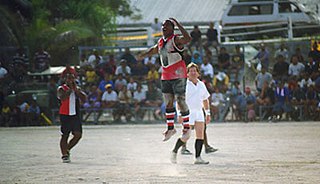
The Geography of Australian rules football describes the sport of Australian rules football played in more than 60 countries around the world. By 2017 more than 26 nations had contested the Australian Football International Cup, the highest level of worldwide competition.

Women's Australian rules football, is the female-only form of Australian rules football, generally with some modification to the laws of the game.
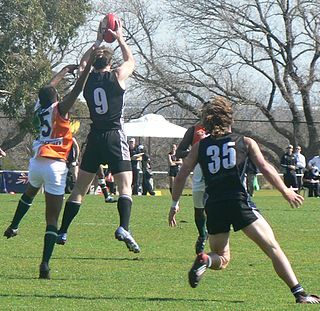
Australian rules football in New Zealand is notable as the first colony outside of Australia to take up the sport as early as the 1860s and was home to the first club formed outside Australia in 1876. The sport's official name was changed in 1890 to Australasian Football acknowledge New Zealand's participation and remained for some time even after the country was expelled from the Australasian Football Council. After a half century hiatus of organised competition, it has grown rapidly as an amateur sport. Today five of New Zealand's sixteen regions have organised competitions: Auckland ; Canterbury ; Wellington ; Waikato and Otago. A four-team national competition with a national draft has been contested at the North Harbour Stadium in Auckland since 2016 for men and 2019 for women. The national team were crowned International champions at the 2005 Australian Football International Cup and competed annually against the AFL Academy between 2012 and 2019. Since the 2010s the game has also grown at junior level among New Zealand schools as the "Hawks Cup".
Australian rules football in the United States is a team and spectator sport which has grown rapidly since the late 1990s.

Australian rules football in England is a team sport and spectator sport with a long history. It is home to the longest running Australian rules fixture outside Australia, the match between Oxford and Cambridge Universities which has been contested annually since 1923. All other current competitions originated in 1989 with the founding of what is now AFL London, the longest running Australian rules football league in Europe. The current governing body, AFL England, was formed in 2012 and expanded the game in 2018 to include the additional regional divisions: AFL Central & Northern England and AFL Southern England.

Australian rules football in Papua New Guinea (PNG) is a developing team sport which was initially introduced by Australian servicemen during World War II. The governing body for the sport is the PNG Rules Football Council, with the development body being AFL PNG. The junior development version is known locally as Niukick. Regionally, AFL PNG is affiliated with AFL Oceania.
Australian rules football in South Africa is a team sport played at amateur level in the country with a small audience. The governing body is AFL South Africa.

The 2008 Australian Football International Cup was the third time the Australian Football International Cup, an international Australian rules football competition, has been contested.
Australian rules football in Samoa has been played since 1997.
The sport of Australian rules football has been played in Fiji since at least 1963, when an exhibition was held in Suva.
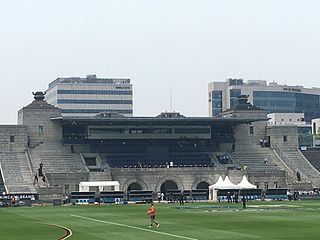
Australian rules football in China has been played since the 1989 and grew in popularity in the 2010s.
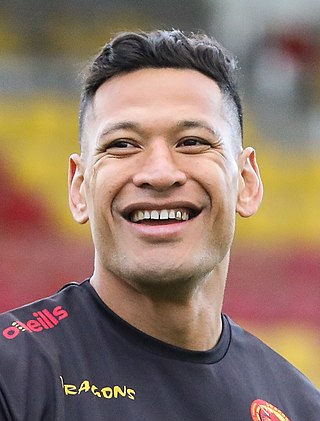
Israel ‘Isileli Folau is a professional dual-code rugby player who plays as a fullback for Japan Rugby League One club Urayasu D-Rocks. Born in Australia, he represents Tonga at international level after qualifying on ancestry grounds.

Australian rules football in Africa is most organised in South Africa, although there are programs under development in many African nations including Botswana, Egypt, Ghana, Kenya and Zimbabwe and there are plans to introduce the sport into more African countries.

Australian rules football in Oceania is the sport of Australian rules football as it is watched and played in the Oceanian continent. The regional governing and development body is AFL South Pacific it is affiliated to the AFL Commission and was formed in 2008.
Australian rules football in Asia dates back to 1910 but was only sporadically played until the 1980s after which it has boomed. Clubs have begun in most Asian countries and a governing body for the region, AFL Asia was formed in 2008 to coordinate the Asian Championship and promote its affiliated leagues. AFL Asia estimates that there are now more than 10,000 Australian Football players across the continent.

Australian rules football is played in Europe at an amateur level in a large number of countries. The oldest and largest leagues are those in the United Kingdom, Ireland and Denmark, in each of these nations there are several established clubs, and organised men's, women's and juniors programs. The British AFL has now expanded into Welsh, Scottish and English leagues. The Danish AFL has been responsible for the expansion of Australian Football into Sweden, Finland, Iceland and Norway. The governing body for Australian Football in Europe was founded in Frankfurt in January 2010; the body was initially called the European Australian Football Association, but changed its name to AFL Europe at a general assembly meeting in Milan in October of the same year. It currently has 22 member nations. AFL Europe, with backing of the AFL in Australia has overseen a large improvement in the organisation of Australian football in Europe.
Australian rules football in the Middle East describes the minority sport of Australian rules football as it is watched and played in the Middle East region.
Australian rules football has been played at an organised amateur level in the United States and Canada since around 1990. There have also been clubs formed for occasional play in Bermuda, Brazil, Chile, Argentina and Colombia.
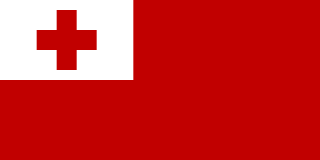
Rugby union is the national sport in Tonga. Sumo has a following, while football, judo, surfing, volleyball, and cricket have gained popularity in recent years. Rugby league and Australian football are also played.













